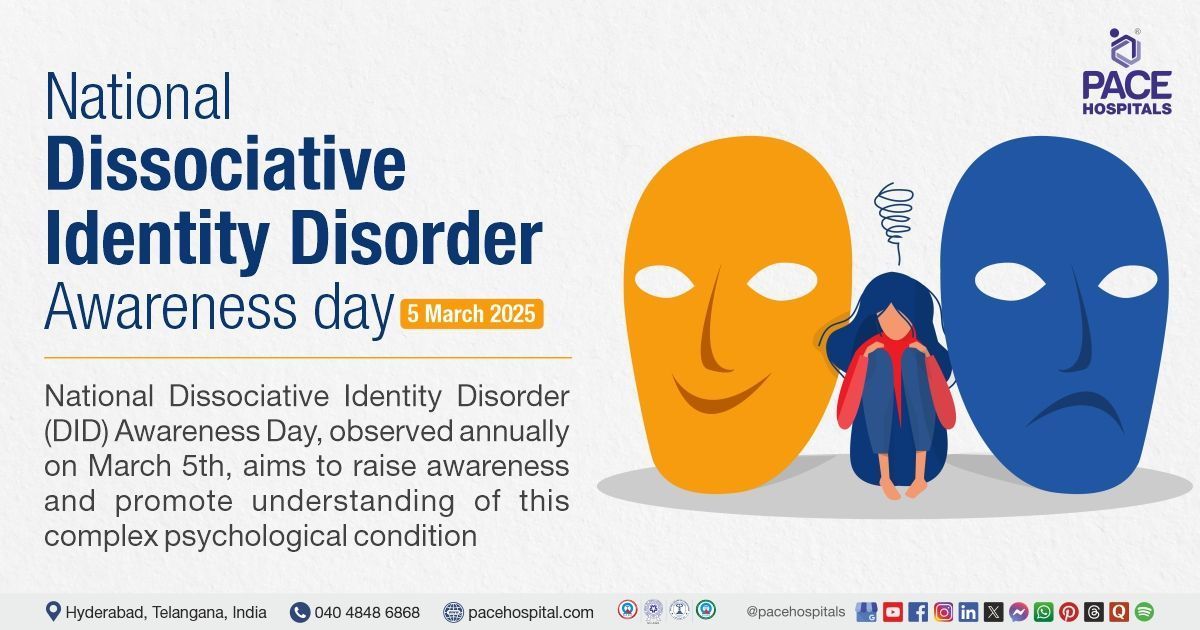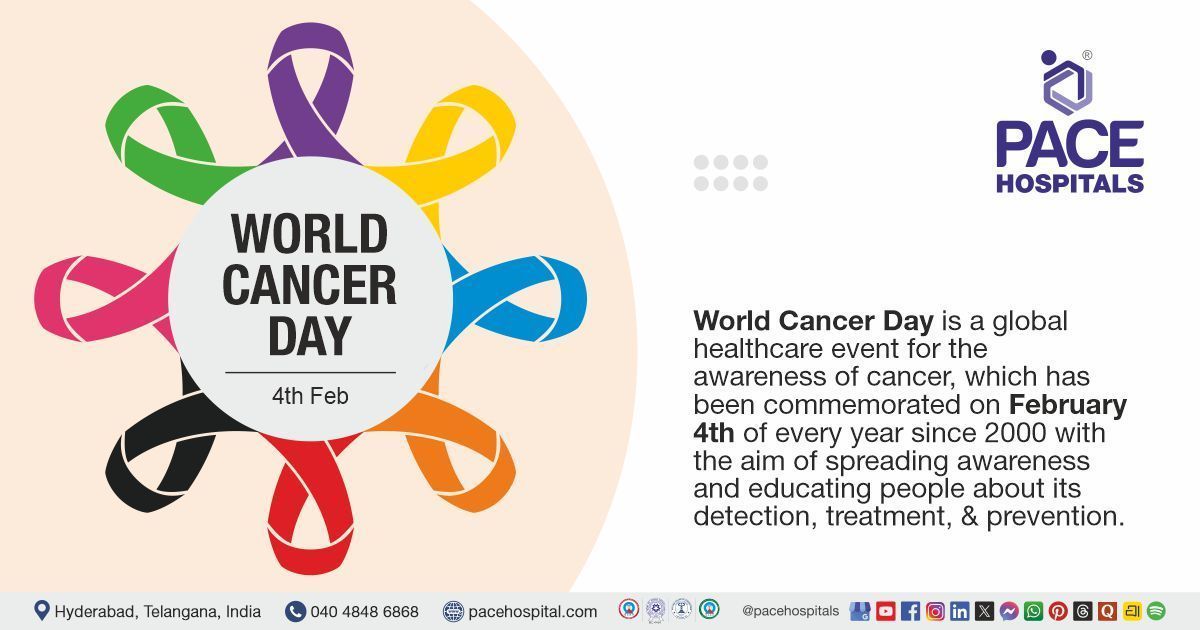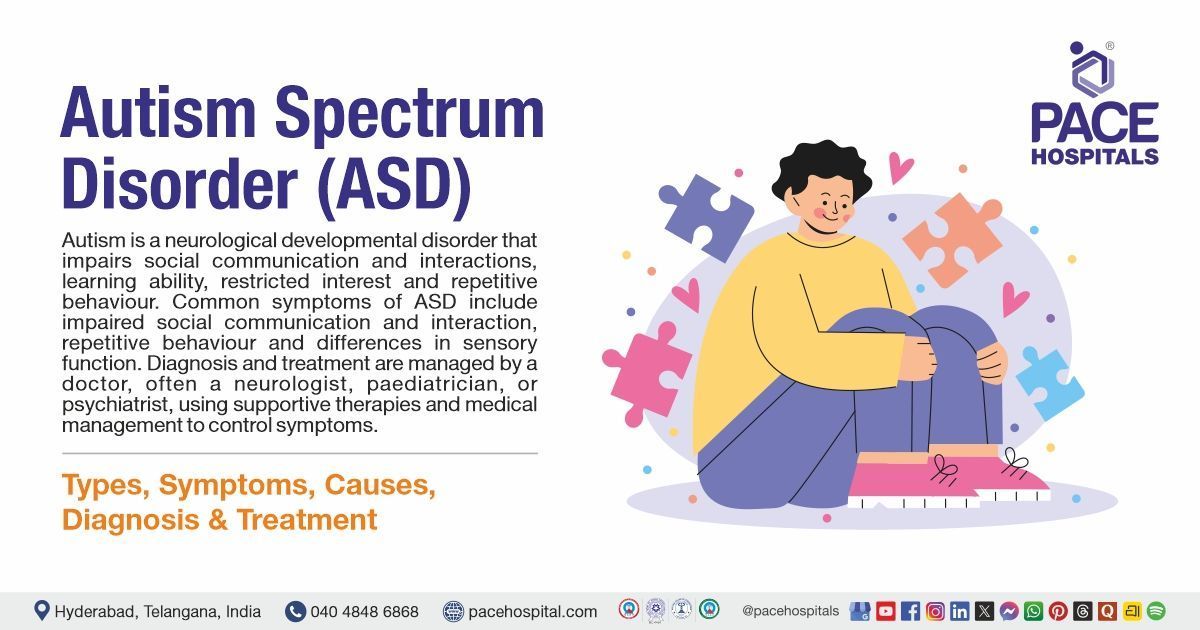National Dissociative Identity Disorder (Multiple personality disorder) Awareness Day, 5 March 2025
PACE Hospitals
National Dissociative Identity Disorder (DID) Awareness Day, observed annually on March 5th, aims to raise awareness and promote understanding of this complex psychological condition. It combats stigma, educates the public about DID's realities, and supports those affected.
Advocacy efforts focus on increasing access to proper diagnosis, treatment, and compassionate care for individuals with DID, while encouraging research and public discourse to foster a more informed and supportive society.
Understanding Dissociative Identity Disorder (DID)
Dissociative Identity Disorder, earlier known as Multiple Personality Disorder, is a severe dissociative condition often linked to childhood trauma, abuse, or neglect. Individuals with DID experience disruptions in identity, memory loss, emotional detachment, and may have multiple distinct personality states. Despite being a recognized medical condition, DID is often misunderstood due to misrepresentation in media and societal misconceptions.
Symptoms of Dissociative Identity Disorder (DID)
DID is a serious mental health disease followed by struggling in identity, memory, and perception. The symptoms can differ in severity and may affect daily life and functioning.
- Multiple Distinct Identities: Individuals with DID experience two or more separate personality states, each with their own unique behaviors, emotions, and memories.
- Memory Gaps (Dissociative Amnesia): Significant lapses in memory, including forgetting important life events, daily activities, or traumatic experiences, unrelated to normal forgetfulness.
- Depersonalization and Derealization: A sense of detachment from oneself (depersonalization) or feeling like the world around them is unreal (derealization).
- Sudden Mood and Behavior Changes: Unexpected shifts in emotions, reactions, or personality traits, often without the person's awareness or control.
- Hearing Voices or Internal Conversations: Some individuals report hearing voices or experiencing internal dialogue between different identities.
Importance of National Dissociative Identity Disorder (DID) Awareness Day
National Dissociative Identity Disorder (DID) Awareness Day is essential in fostering understanding, breaking stigma, and advocating for better mental health support for those living with DID.
- Spreading Awareness and Education: Observed on March 5th, this day educates the public about DID, corrects misconceptions, and fights stigma caused by media misrepresentation.
- Recognizing DID as a Trauma-Related Disorder: Highlights that DID develops as a response to severe childhood trauma, emphasizing the need for early diagnosis and appropriate treatment.
- Promoting Compassionate Care and Support: Encourages mental health professionals to improve diagnosis, treatment, and provide compassionate, stigma-free healthcare with better resources.
- Encouraging Open Discussions and Research: The initiative promotes open discussions and research among medical professionals, researchers, and the public, promoting understanding of causes, treatments, and recovery strategies.
- Empowering Individuals with DID: The program empowers individuals with DID by offering a platform for sharing experiences, promoting self-acceptance, and improving access to mental health resources and peer support.
History of Dissociative Identity Disorder (DID) day
Dissociative Identity Disorder, earlier known as Multiple Personality Disorder, is a critical mental health condition characterized by memory loss, out-of-body experiences, emotional detachment, and a fragmented self-identity, which may lead to suicidal thoughts. Despite its recognition as a real disorder, only 2% of Americans experiencing these symptoms have been properly diagnosed, according to the National Alliance on Mental Illness.
Historically, DID was misunderstood and misdiagnosed. In the 19th century, it was often mistaken for sleepwalking, epilepsy, or emotional trauma responses. The first correctly diagnosed patient was Louis Vivet in 1885, drawing medical attention to the condition. Clara Norton Fowler became the first patient properly studied by a neurologist in 1898. Schizophrenia, discovered in 1906, led to decades of misdiagnosis of DID, but gained clearer recognition in the 1980s, distinguishing it from other psychological conditions. Dissociative Identity Disorder Day (DID) empowers people suffering with Dementia Spectrum Disorder (DSD) to share their stories, seek self-acceptance, and navigate life with confidence. It raises public awareness about the disorder, challenging misconceptions and encouraging better understanding. The day's symbol is a multicolored ribbon representing the diversity and complexity of identities within DID.
Prevention of Dissociative Identity Disorder (DID)
Dissociative Identity Disorder (DID) is often linked to severe childhood trauma. While complete prevention may not always be possible, early intervention, mental health support, and a nurturing environment can help reduce the risk of its development.
- Early Intervention in Childhood Trauma: Identifying and addressing childhood trauma early can prevent DID. Providing children with safe, supportive environments and encouraging open communication helps them process distress in a healthy way, reducing dissociative symptoms.
- Access to Mental Health Support: Timely counseling and therapy can help individuals process trauma before it leads to severe dissociation. Early diagnosis and treatment of PTSD, anxiety, and depression can lower the risk of developing DID.
- Trauma-Informed Parenting and Caregiving: Educating parents and caregivers on the impact of trauma promotes emotional validation and non-violent discipline. A trauma-informed approach in foster care and adoption systems ensures stability and support for at-risk children.
- Teaching Healthy Coping Mechanisms: Encouraging mindfulness, journaling, breathing exercises, and therapy-based activities can help individuals regulate emotions. Promoting healthy lifestyle choices and discouraging substance abuse prevents harmful coping behaviors.
Prioritizing early intervention, trauma-informed care, and mental health awareness can significantly reduce the risk of DID, ensuring better long-term mental well-being.
Share on
Request an appointment
Fill in the appointment form or call us instantly to book a confirmed appointment with our super specialist at 04048486868











